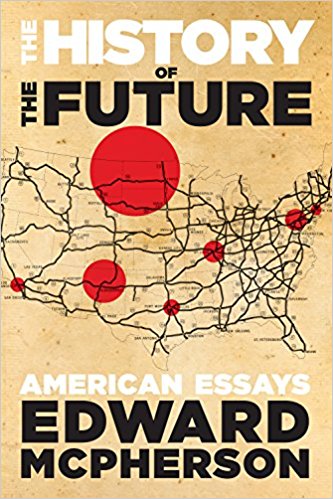Faculty Author Edward McPherson Discusses New Book, ‘The History of the Future’

An assistant professor in the Department of English, Edward McPherson explores the state of the nation in his new book, The History of the Future: American Essays (Coffee House Press), a collection of narratives that examine diverse parts of the country, including Dallas, New York, Los Angeles, and St. Louis. In each locale, McPherson views the future through the filter of the past, touching upon topics such as racism and climate change. From the oil boomtowns of North Dakota to the bomb-testing sites of New Mexico, in essays that blend history, reportage, and memoir, he provides a kaleidoscopic look at American life.
McPherson is the author of two previous nonfiction books, Buster Keaton: Tempest in a Flat Hat (Faber & Faber) and The Backwash Squeeze and Other Improbable Feats (HarperCollins). He’ll discuss The History of the Future on Tuesday, November 28 at a Library Faculty Book Talk. The talk will take place at 4:30 p.m. in Room 142 of Olin Library and will be followed by a reception. The event is free and open to the public.
We recently caught up with McPherson for a Q&A about The History of the Future.
The ways in which the past can shed light upon the future is a concept that’s central to the book. What sparked this idea for you? I’ve long been a fan of that quip attributed to Mark Twain: “History doesn’t repeat itself; it rhymes.” I love history for the way it not only enlarges our understanding of the past, but opens up new perspectives on the present and maybe, just maybe, the future. Like any book, this one started with a series of obsessions. I wrote one essay at a time, hoping the whole thing might cohere into something greater than the sum of its parts.

I began with an essay about Dallas, both the city (which was coming up on the 50th anniversary of the Kennedy assassination) and the TV show (which was being rebooted with a new generation of stars). I grew up in Dallas in the echoes of those two mysteries: Who shot JFK? Who shot JR? I then finished an essay about an old family home in Gettysburg and started one on race in St. Louis, where I still considered myself a newcomer. And rather quickly that old pattern emerged: I was interested in the ways that the past might intrude (unexpectedly, uncomfortably) into the present.
The subtitle of the book is “American Essays.” Aside from the fact that the pieces are set in this country, what makes them uniquely American? I think it goes back to that old American ambivalence—we’re deeply invested in our history and yet we want to be free from it. (Or proudly ignorant of it.) We live in a country of constant erasure (due to greed, expediency, what have you—just ask the indigenous populations). Going along with this, there’s long been a strain of popular thinking that prizes action (any action!) overthinking. (See our movie heroes, our politicians, etc.) And yet we often try to claim something special about this land we inhabit—we’re invested in the idea of place and of what has come before.
Gore Vidal put his finger on this ambivalence when he called America the “United States of Amnesia,” and I think with my book I’m hoping to combat that inattention, the perpetual distraction that seems to be our current mode of being in the world. These days it hardly feels like it needs to be said, but there are real consequences to ignorance and/or willful blindness.
You used materials from University Libraries’ Department of Special Collections in writing the book. Which collections did you draw upon and how did you used the materials? I reviewed the personal papers of Arthur Holly Compton, the Nobel Laureate who oversaw the construction of the first nuclear reactor. He was a leader of the Manhattan Project who, after the war, became the ninth chancellor of Washington University (where he recruited a number of scientists from Los Alamos). Our university—and our city—has deep atomic ties, and Compton was a way to shed some light on that in my essay on nuclear weapons. That essay focuses much more on New Mexico and the Trinity Test Site, but I wanted to make the point that so many places are complicit in our nation’s thorny nuclear legacy, the fallout from which everyone remains subject to today.
As an essayist, do you see yourself as working in any particular tradition? Who are your influences? I have always loved the essay’s interdisciplinary reach. For this book, I read about history, engineering, urban planning, nuclear physics, climate change, architecture, and space exploration. I spent a week with a paleontologist digging for dinosaurs; I had lunch with the last astronaut to step onto the moon; I brought back a radioactive rock from a nuclear test site and had it analyzed by a professor in our Department of Earth and Planetary Sciences. Meanwhile, these essays mix the personal and the political, facts and anecdote, and while I use many of the tools of journalism (the interview, the reporting trip, and so on), these essays are deeply passionate and certainly don’t pretend to any sort of pure objectivity.
In this regard, there are a number of writers to whom I owe a great debt: Rebecca Solnit, Elizabeth Kolbert, Teju Cole, Valeria Luiselli, Lillian Ross, John McPhee, Hilton Als, Svetlana Alexievich, Robert Sullivan, Jo Ann Beard, Susan Orlean, Jamaica Kincaid, and James Baldwin, among others. When I was off wandering the Badlands or oil boomtowns or the atomic desert, the books I most often carried with me were the Joan Didion classics from the ’60s and ’70s (Slouching Towards Bethlehem, The White Album). As the book grew darker, something about her paranoia, her relentlessly apocalyptic imagination felt right.
